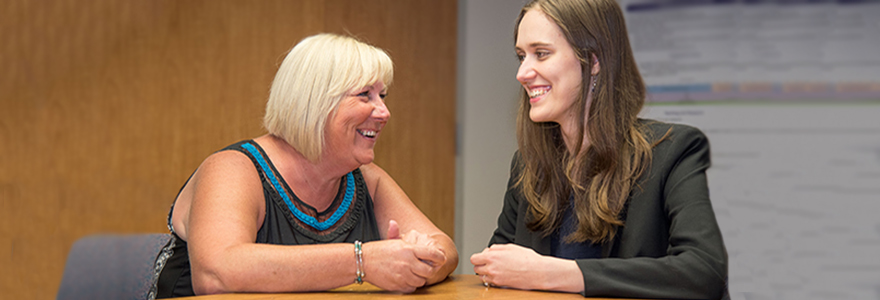Learning from Staff

LHSC hosts more than 700 medical students each year with the majority being third and fourth year undergraduate students studying to become physicians. The third year students are commonly known as medical clerks. Of these, 132 are third year students from the Schulich School of Medicine & Dentistry, Western University, while fourth year students are predominantly from other medical schools from across the country, who are doing electives.
For many of these students, clerkship is the first immersion into the clinical world. Lisa Shepherd, Clerkship Chair at Schulich Medicine & Dentistry and an LHSC Emergency Room physician knows that “clerkship is the biggest transition they make in their career. They go from the classroom setting to the clinical world where right and wrong answers are much less definitive.
The shift to the clinical setting from the classroom is one that all medicine students experience, and staff play a key role in helping with this transition. Medical clerks rely on guidance of the seasoned professionals to orient them to the setting and help them with their learning.
One third year Schulich Medicine student, Katherina Baranova, Medicine Class of 2020 knows the impact staff can have from first-hand experience. “There have been individuals in all my rotations in clerkship thus far who have been amazing in helping me and the other clerks out and showing us the ropes. Looking back I can say I couldn’t have done it without all their help. It really takes a village to raise a clerk!
Dr. Shepherd has watched clerks move through clerkship and interact with staff. “Clerks are hugely grateful to the staff. The staff are very good at supporting students and helping them through this time.” Clerks rotate through six core areas of medicine, surgery, obstetrics and gynaecology, paediatrics, family medicine and psychiatry at both LHSC and St. Joseph’s hospitals.
Katherina recalls how the nurses in the operating room helped her adjust and excel in her learning during her surgery rotation. They showed her everything from donning the gowns to where to stand in the OR as well as a how to properly ask for and hand back instruments. It was gaining this practical experience that gave her the opportunity to help prep and drape the patient. Seeing Katherina do this competently led the surgeon to giving her more responsibility including making her first incision during surgery.
It’s not only the nursing staff that impacts clerks. When asked who has had the greatest impact on her, Katherina mentions Lisa Walker, an administrative assistant in the Pathology Department at LHSC. “She helped me a ton in the Pathology department, from sorting out my card access and paperwork, to making sure I felt welcome and knew everything that was going on. She even printed me a name plate for my desk! A lot of times the administrative people are forgotten because they’re not front-line health-care workers, but I think without them the hospital couldn’t run and they support us all.
As Clerkship Chair, Dr. Shepherd sees how students learn from ancillary staff not only about the clinical setting but also about life in general. “I can’t stress the importance of working with staff. They build a unique relationship – it is not only about the knowledge but more about survival.
Providing a supportive environment supports LHSC’s Strategic Direction: Drive an Integrated Clinical, Teaching & Research Culture. This strategic direction aims to fulfill our tripartite mandate comprised of patient care, education and research.








